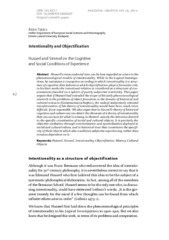Intentionality and Objectification - Husserl and Simmel on the Cognitive and Social Conditions of Experience
Апстракт
Husserl’s transcendental turn can be best regarded as a turn in his phenomenological models of intentionality. While in the Logical Investiga¬tions, he maintains a conception according to which intentionality is a struc¬ture of cognitive directedness in which objectification plays a formative role, in his later works the intentional relation is considered as a structure of con-sciousness founded on a sphere of purely subjective interiority. This paper argues that if Husserl had extended the scope of his early phenomenological research to the problems of object formation in the domain of historical and cultural sciences (Geisteswissenschaften), the radical subjectively oriented transformation of his theory of intentionality would have been much more difficult, if not impossible. We also argue that in Simmel’s theory of historical cognition and culture one can detect the elements of a theory of intentionality that can account for what is missing in Husserl, namely the attention devoted t...o the specific constitution of social and cultural objects. It is precisely the objective mediation through exteriorization and symbolization deployed in social and cultural values, and in historical time that constitutes the specifi¬city of these objects which also conditions subjective experiencing, rather than remains dependent on it.
Кључне речи:
Husserl, Edmund / intentionality / Simmel / objektifikacijaИзвор:
Filozofija i društvo / Philosophy and Society, 2014, 42-55Издавач:
- Beograd : Institut za filozofiju i društvenu teoriju
Институција/група
IFDTTY - JOUR AU - Takács, Ádám PY - 2014 UR - http://rifdt.instifdt.bg.ac.rs/123456789/200 AB - Husserl’s transcendental turn can be best regarded as a turn in his phenomenological models of intentionality. While in the Logical Investiga¬tions, he maintains a conception according to which intentionality is a struc¬ture of cognitive directedness in which objectification plays a formative role, in his later works the intentional relation is considered as a structure of con-sciousness founded on a sphere of purely subjective interiority. This paper argues that if Husserl had extended the scope of his early phenomenological research to the problems of object formation in the domain of historical and cultural sciences (Geisteswissenschaften), the radical subjectively oriented transformation of his theory of intentionality would have been much more difficult, if not impossible. We also argue that in Simmel’s theory of historical cognition and culture one can detect the elements of a theory of intentionality that can account for what is missing in Husserl, namely the attention devoted to the specific constitution of social and cultural objects. It is precisely the objective mediation through exteriorization and symbolization deployed in social and cultural values, and in historical time that constitutes the specifi¬city of these objects which also conditions subjective experiencing, rather than remains dependent on it. PB - Beograd : Institut za filozofiju i društvenu teoriju T2 - Filozofija i društvo / Philosophy and Society T1 - Intentionality and Objectification - Husserl and Simmel on the Cognitive and Social Conditions of Experience SP - 42 EP - 55 DO - 10.2298/FID1402042T ER -
@article{
author = "Takács, Ádám",
year = "2014",
abstract = "Husserl’s transcendental turn can be best regarded as a turn in his phenomenological models of intentionality. While in the Logical Investiga¬tions, he maintains a conception according to which intentionality is a struc¬ture of cognitive directedness in which objectification plays a formative role, in his later works the intentional relation is considered as a structure of con-sciousness founded on a sphere of purely subjective interiority. This paper argues that if Husserl had extended the scope of his early phenomenological research to the problems of object formation in the domain of historical and cultural sciences (Geisteswissenschaften), the radical subjectively oriented transformation of his theory of intentionality would have been much more difficult, if not impossible. We also argue that in Simmel’s theory of historical cognition and culture one can detect the elements of a theory of intentionality that can account for what is missing in Husserl, namely the attention devoted to the specific constitution of social and cultural objects. It is precisely the objective mediation through exteriorization and symbolization deployed in social and cultural values, and in historical time that constitutes the specifi¬city of these objects which also conditions subjective experiencing, rather than remains dependent on it.",
publisher = "Beograd : Institut za filozofiju i društvenu teoriju",
journal = "Filozofija i društvo / Philosophy and Society",
title = "Intentionality and Objectification - Husserl and Simmel on the Cognitive and Social Conditions of Experience",
pages = "42-55",
doi = "10.2298/FID1402042T"
}
Takács, Á.. (2014). Intentionality and Objectification - Husserl and Simmel on the Cognitive and Social Conditions of Experience. in Filozofija i društvo / Philosophy and Society Beograd : Institut za filozofiju i društvenu teoriju., 42-55. https://doi.org/10.2298/FID1402042T
Takács Á. Intentionality and Objectification - Husserl and Simmel on the Cognitive and Social Conditions of Experience. in Filozofija i društvo / Philosophy and Society. 2014;:42-55. doi:10.2298/FID1402042T .
Takács, Ádám, "Intentionality and Objectification - Husserl and Simmel on the Cognitive and Social Conditions of Experience" in Filozofija i društvo / Philosophy and Society (2014):42-55, https://doi.org/10.2298/FID1402042T . .


